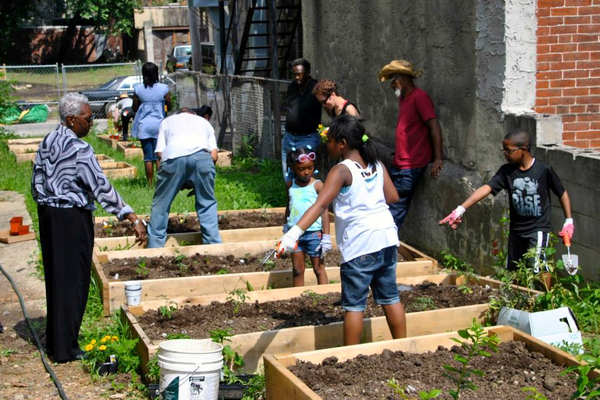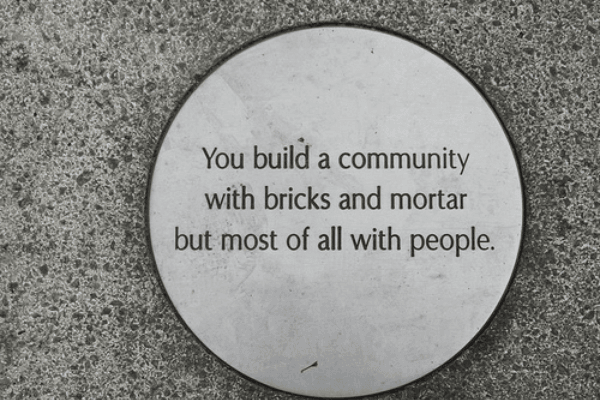Are you a community member and friend looking to propel food justice forward? Join the Grapevine and become a community advocate!
Gardening as Community Power
Tagged: archive
- This topic has 1 voice and 0 replies.
-
AuthorPosts
-
-
February 7, 2019 at 11:53 pm #216910
 aliKeymaster
aliKeymaster02/22/2015
Written by Kirtrina Baxter & Nicole Sugerman

With all the civil unrest around the brutality and unjust policing of communities of color, people are looking around their neighborhoods to see just how they can make a difference. People are asking their community leaders, “what are the next steps for justice?” and thinking about strategies to gain community adhesion and sovereignty. The topic of community power and how to attain it, is chief among concerns.
Creating a community garden can be a strong force for community power. Not only in the radical act of producing one’s own food, a necessary requirement to live. Or in the ability a garden has to bring unity to a neighborhood through a shared space of positive work. But inherent in the process of determining how land is used in your neighborhood, communities can help to build community power! Now let me explain.
The process of creating a community garden has a few major steps that are important to consider: choosing a particular site (hopefully along with other residents), and garnering approval of this site as a space for gardening and community gatherings from neighbors, council people, and owners. Then, community members must work together to create guidelines and protocols to ensure a functional, communicative garden. The process of gaining approval and securing land for the garden is where we start to build power.
In order to be successful at creating a long-term community garden, engaging residents in the area in creating the plan for that space is essential. It creates a symbiotic relationship between neighbors towards a common goal that could benefit everyone. Building trust, accountability and respect for the opinions and creativity of all, is a large part of this process. In order for this to be successful, first, participants should be willing to do the hard introspective work of breaking down whatever stereotypes and biases that would make it difficult for them to work with a diverse group of people. This does not just relate to ethnicity but to religion, sub-culture, sexual preference, gender, and class. This process in itself allows for personal growth that adds to one’s own sense of power.
Second, creating processes to work together and create strategy toward the goal of getting the land builds cohesion among the group and power in your community. Things to be considered are, what skills do people bring to the table and how can those skills be applied to the agreed upon strategy? Communities must plan tactics to further the group’s strategy, this works to create power through research and knowledge sharing and advances collaboration and action.

Through this community organizing and outreach, your neighborhood will build trust, inclusion, and models of communication. With careful and deliberate engagement at this first step, communities are creating organized structures that can be used to demonstrate power around anything, be it police brutality, gentrification, or a neighbor in need of support.Knowledge is power! As the project moves forward, the group learns more through shared skills, resources and experiences, prioritizing building and supporting new leaders within the community. This positions them better towards achieving their goal. For example, if one person knows someone who writes for a newspaper, they would share this information with the group. Together, a few of the residents, preferably a mix including those who have media experience, would work on getting an article done. Those folks having media experience would help guide the process. Also, contacting, and doing interviews with the reporter will be an added experience for those who have not done so before, and make the next time more efficient. Sharing skills around aspects of organizing, including facilitating meetings, talking to the media, communicating with council members, and more, help build community power by illuminating confusing systems, building individuals’ skillsets, and making processes for getting your voice heard more accessible and understandable. In addition, through these processes you are giving your project voice to a larger audience, bringing additional support to your project…More Power!
Going through each of the steps required to reach the goal of starting a community garden is an educational process that adds to your community’s knowledge: effecting community approval, generating support from your council person’s office, influencing media, and working together to organize a garden all bring with them the pearls of wisdom that give power to our communities. Added to the radically powerful act of increasing neighborhood sovereignty by growing your own food, is the powerful act of determining, as a community, how land should be used in your neighborhood, and working together get your community’s plan realized by creating a garden. Accomplishing something together can motivate communities, give them a sense of their own power, and encourage them to fight together for other purposes in the future. Together, we can use these skills and processes to create powerful, unified communities.
-
-
AuthorPosts
- The topic ‘Gardening as Community Power’ is closed to new replies.


